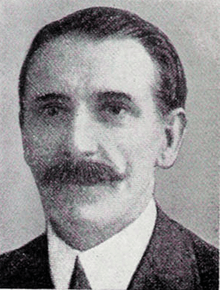Alexander Gordon Cameron
Alexander Gordon Cameron (15 June 1876[1] – 30 May 1944) was a British trade unionist and Labour Party politician.[2]

Biography
Cameron was born in 1876 in Oban, Argyll, and served his apprenticeship as a joiner in Glasgow.[3] On becoming a journeyman he moved to London, where he became an active member of the Amalgamated Society of Carpenters and Joiners (ASC&J), becoming the union's shipping delegate in 1912, and assistant general secretary in 1915, and general secretary in 1919. When the ASC&J became part of the Amalgamated Society of Woodworkers in 1921, Cameron was its first general secretary.[4]
He was nominated by his union as a parliamentary candidate for the Independent Labour Party. After failing to become the prospective candidate for Glasgow Camlachie in 1908, and the ASC&J declined an invitation to sponsor him as candidate for Coventry in the following year.[5] He stood unsuccessfully at Liverpool Kirkdale at the January 1910 general election and again at a by-election later in the year. In the December 1910 general election he was defeated at Jarrow, where Labour lost to the Liberals.[6]
In 1914 Cameron was elected to the executive of the Labour Party, a position he was to retain for many years.[3][7] In 1917 he was appointed by the Coalition Government to be one of the Scottish members of the Commission on Industrial Unrest.[8] In 1918 he again failed to be elected to parliament, this time at Woolwich West.[9]
In 1920 Cameron was part of the Labour Party delegation to the Second International in Geneva.[10] He was elected chairman of the Labour Party for 1920/21.[4] In 1925 ill health led to his resigning from his posts as representative to the Socialist International and general secretary of the woodworkers' union.[4][11]
At the 1929 general election Cameron finally succeeded in being elected, becoming MP for Widnes. He was however defeated at the next election in 1931 when there was a large swing against Labour.
Cameron retired from politics, and at the time of his death in a London hospital in 1944, was described as a building contractor.[3]
References
- 1939 England and Wales Register
- Who's Who
- "Obituary: Mr A. G. Cameron" The Times, 31 May 1944 p.8
- "Amalgamated Society of Woodworkers including the Amalgamated Society of Carpenters and Joiners". Trade Union Ancestors. Archived from the original on 9 May 2008. Retrieved 13 September 2008.
- Election Intelligence, The Times, 10 December 1908, p.11, 8 May 1909, p.12
- County Constituencies, The Times, 21 November 1910, p.9
- The Times, 30 January 1914, p.8
- Labour Unrest Commissioners, The Times, 16 June 1917, p.3
- The Election, The Times, 25 November 1918, p.9
- The Second International, The Times, 20 July 1920, p.9
- News in Brief, The Times, 26 February 1925, p.9
External links
- Hansard 1803–2005: contributions in Parliament by Alexander Gordon Cameron
| Parliament of the United Kingdom | ||
|---|---|---|
| Preceded by Christopher Clayton |
Member of Parliament for Widnes 1929–1931 |
Succeeded by Roland Robinson |
| Party political offices | ||
| Preceded by William Harold Hutchinson |
Chairman of the Labour Party 1920–1921 |
Succeeded by Fred Jowett |
| Trade union offices | ||
| Preceded by New position |
Assistant General Secretary of the Amalgamated Society of Carpenters and Joiners 1915–1919 |
Succeeded by Frank Wolstencroft |
| Preceded by Francis Chandler |
General Secretary of the Amalgamated Society of Carpenters and Joiners 1919–1921 |
Succeeded by Post abolished |
| Preceded by New post |
General Secretary of the Amalgamated Society of Woodworkers 1921–1925 |
Succeeded by Frank Wolstencroft |